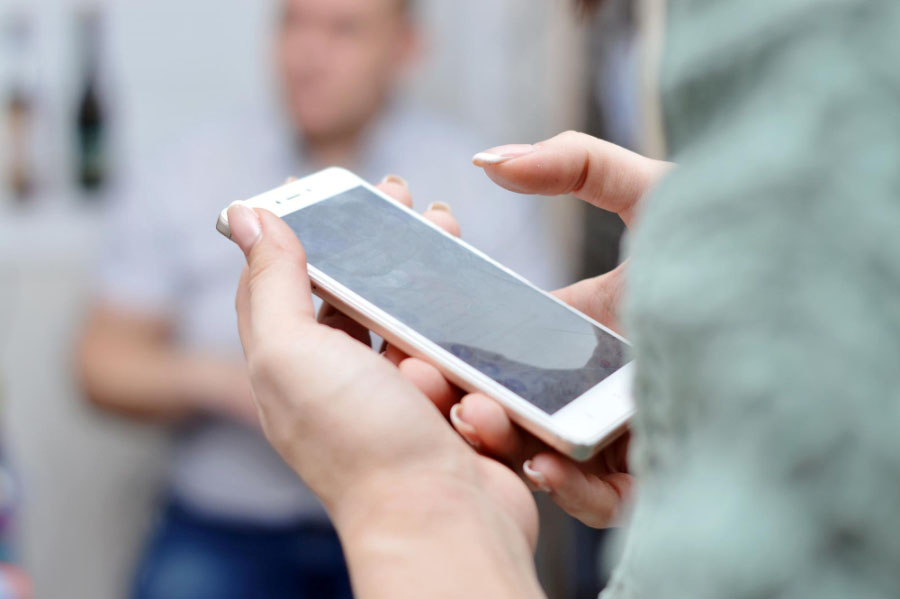When you’re about to begin a rehab program or reviewing options, it’s common to worry about losing access to your phone during treatment. It’s a valid concern since our phones can play a big role in our daily lives, and you may feel uneasy thinking about going without it.
Many addiction treatment centers don’t allow phones in rehab or restrict use to limit distractions and ensure residents focus on their treatment program.
Can you have your phone in rehab? What’s our cell phone policy in rehab at Genesis House? We’ll provide you with everything you should know and considerations you should make before starting a treatment program.
Why Some Rehabs Limit Phone Use
First, you may wonder why using a phone in rehab centers isn’t allowed or is limited. While it can seem like a difficult rule, there are actually a lot of good reasons for it. Rehab centers may limit phone use because:
It Can Distract from Treatment
Phone use can distract your focus from essential activities like therapy, group work, and life skill building.
Many addiction rehab centers promote mindfulness or work with clients to understand how their thoughts affect their behavior. It can feel harder to take that time to reflect when your phone is within reach, and you start worrying about what’s happening at work while you’re away or the new social media post your friend made.
It Can Cause Triggers
Beginning addiction treatment is a challenge for the mind and body. It’s common to have a lot of cravings for drugs early on, and triggers that remind you of drug use can feel a lot more intense. Therefore, seeing a post on social media that’s related to drugs or alcohol or talking to people who remind you of drug use could cause issues.
A report from the Journal of Current Psychiatry Reports mentions several clinical studies suggesting that approximately two-thirds of people relapse within weeks or months of beginning treatment. Therefore, treatment centers should do everything they can to minimize triggers during those early stages for higher chances of success.
Phones Can Cause Privacy and Safety Concerns
Rehab centers take privacy and confidentiality seriously. Phones can interfere with that if clients are posting photos or videos online of themselves or others at the facility. Therefore, limiting phone use helps ensure the privacy of everyone receiving care.
Unplugging Facilitates Healing
Research shows that chronic stress plays a big role in addiction risks, and phone use can play a role in stress levels. A study from BMC Public Health assessed adults ages 20-24 with varying levels of mobile phone use and found that there was a significant correlation between high levels of screen time and symptoms of stress, depression, and sleep disturbances.
Therefore, unplugging can be part of the healing process. It allows residents at the treatment center to focus on recovery, unwind, and stop worrying about everything happening in the outside world for a bit.
Then, as clients progress, the treatment team can start helping them prepare to better manage life’s stresses without the use of drugs or alcohol for successful outcomes after leaving the facility.
Types of Phone Policies in Rehab
Rehab phone use rules can vary at each treatment center. When you’re wondering, “Do rehabs allow phones?” it’s important to consider the different types of phone use policies to know what to expect while reviewing each center’s guidelines. The most common policies are:
- No-phone policies: A no-phone policy means that the treatment center will collect your device during intake and return it once you leave the facility. This is the most common policy during rehab.
- Limited use policies: Some treatment centers may allow you to use your phone at designated times during the day in certain areas of the facility.
- Supervised communication: Allows clients to use phones while supervised by a staff member. This policy may be applied during emergencies or when essential communication is needed.
Can You Have Your Phone at Genesis House?
We usually apply a no-phone policy at Genesis House. If clients bring their cell phones, laptops, or other similar technology, the devices will be placed in our safe during admission and returned at discharge.
Our goal with this policy is to achieve an uninterrupted healing process and provide a program that achieves the best possible chance of success. Having clients give up their phones during their stay provides a safe and comfortable environment for everyone.
However, our staff is here to assist during emergencies or when you have urgent communication needs that require phone use.
Healthy Alternatives to Constant Phone Use in Rehab
Even when phone use isn’t allowed in rehab, there are several healthy activities clients partake in that take up a significant amount of time and provide positive distractions that facilitate healing. Those include:
- Individual therapy: Attending some form of therapy like cognitive behavioral therapy (CBT) or dialectical behavioral therapy (DBT) is a common staple of addiction treatment programs. Behavioral therapy helps understand how your thoughts affect your behaviors and work on underlying issues contributing to addiction.
- Group therapy: Group therapy sessions provide a sense of community. When group members share, it offers a chance to learn from one another’s experiences and understand that others are going through similar things.
- Exercise: Rehab centers may offer a space to exercise. Regular exercise can increase feelings of well-being and help you build healthy habits that you can continue after leaving the treatment facility.
- Journaling: Writing your thoughts down can help you reflect and gain a better understanding of yourself and your experiences. It’s a great practice in between therapy sessions to organize what you’ve learned and express any challenges you’re facing.
- Mindfulness and meditation: Practicing mindfulness activities like meditation, breathwork, or yoga help calm the mind and body. Studies indicate that mindfulness-based activities can reduce drug cravings and have positive cognitive effects, so it’s a useful practice and a good habit to build.
Staying Connected Without a Phone
Those asking, “Can you bring your phone to rehab?” may worry about how they’ll stay connected to loved ones if phone use isn’t allowed.
When you choose rehab with us at Genesis House, we’ll help you stay in touch with your family. We offer options like scheduled calls or family therapy sessions that can help.
Staying in touch with your family in a calm and organized way helps ensure healthy interactions during treatment.
Options like family therapy can even help you build a positive home base and support system after you leave the facility. It’ll give loved ones a better understanding of how addiction has affected your life and helpful ways they can assist in your recovery.
How Our Rehab Services at Genesis House Can Help
Limiting phone use during addiction treatment is part of the healing process and a policy we use at Genesis House to achieve the best possible rates of success.
When you choose to work with us, we’ll be there to support you each step of the way. We offer a comprehensive range of evidence-based treatment options through medical detox, inpatient care, and outpatient care that can be customized to your needs.
You can get in touch with us today. We’re happy to answer any other questions you have about our services, admissions process, and daily life during rehab.
References
- Sinha, Rajita. “New Findings on Biological Factors Predicting Addiction Relapse Vulnerability.” Current Psychiatry Reports, vol. 13, no. 5, 27 July 2013, pp. 398–405, doi:10.1007/s11920-011-0224-0. https://pmc.ncbi.nlm.nih.gov/articles/PMC3674771/
- Sinha, Rajita. “Chronic Stress, Drug Use, and Vulnerability to Addiction.” Annals of the New York Academy of Sciences, vol. 1141, no. 1, Oct. 2008, pp. 105–130, doi:10.1196/annals.1441.030. https://pmc.ncbi.nlm.nih.gov/articles/PMC2732004/
- Thomée, Sara, et al. “Mobile Phone Use and Stress, Sleep Disturbances, and Symptoms of Depression among Young Adults – a Prospective Cohort Study.” BMC Public Health, vol. 11, no. 1, 31 Jan. 2011, doi:10.1186/1471-2458-11-66. https://pmc.ncbi.nlm.nih.gov/articles/PMC3042390/
- Carroll, Kathleen M., and Lisa S. Onken. “Behavioral Therapies for Drug Abuse.” American Journal of Psychiatry, vol. 162, no. 8, Aug. 2005, pp. 1452–1460, doi:10.1176/appi.ajp.162.8.1452. https://pmc.ncbi.nlm.nih.gov/articles/PMC3633201/
- Garland, Eric L., and Matthew O. Howard. “Mindfulness-Based Treatment of Addiction: Current State of the Field and Envisioning the Next Wave of Research.” Addiction Science & Clinical Practice, vol. 13, no. 1, 18 Apr. 2018, doi:10.1186/s13722-018-0115-3. https://ascpjournal.biomedcentral.com/articles/10.1186/s13722-018-0115-3






